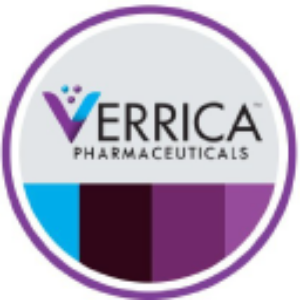Verrica Pharmaceuticals Presents New Data on VP-315 from its Phase 2 Clinical Trial in Basal Cell Carcinoma at the 40th Society for Immunotherapy of Cancer Annual Meeting
Rhea-AI Summary
Verrica Pharmaceuticals (Nasdaq: VRCA) presented Phase 2 translational and clinical data for VP-315 at SITC (Nov 5–9, 2025). In Part 2, 82 subjects (92 tumors) received intratumoral VP-315; an exploratory immune analysis in 22 subjects (24 tumors) showed increased CD3+, CD4+, CD8+ T-cell and CD20+ B-cell densities and reduced immunosuppressive cells 12–14 weeks post-treatment.
Clinical outcomes reported: 97% objective response rate (post-hoc), 51% complete histologic clearance, 86% overall tumor-size reduction, and no treatment-related serious adverse events. Company reported End-of-Phase 2 FDA agreement and is preparing a pivotal Phase 3 program.
Positive
- 97% objective response rate (post-hoc analysis)
- 51% complete histologic clearance rate
- No treatment-related serious adverse events reported
- Immune reprogramming: increased CD3+/CD4+/CD8+ and CD20+ cell densities
- End-of-Phase 2 agreement with FDA to advance toward Phase 3
Negative
- Exploratory immune analysis limited to 22 subjects (24 tumors)
- Key efficacy metric is labeled a post-hoc analysis
- Phase 3 not yet initiated; pivotal timing and funding uncertain
News Market Reaction
On the day this news was published, VRCA gained 11.85%, reflecting a significant positive market reaction. Argus tracked a peak move of +7.0% during that session. Our momentum scanner triggered 4 alerts that day, indicating moderate trading interest and price volatility. This price movement added approximately $4M to the company's valuation, bringing the market cap to $37M at that time.
Data tracked by StockTitan Argus on the day of publication.
– Exploratory Phase 2 analysis shows Verrica’s novel oncolytic peptide, VP-315, reprograms the tumor microenvironment, increasing cytotoxic T-cell infiltration and reducing immunosuppressive T-regulatory cells –
– Findings provide mechanistic immunologic support for clinical efficacy previously reported, including
– Coupled with VP-315’s previously reported safety profile, these results highlight VP-315’s potential as a first-in-class, non-surgical immunotherapeutic option for patients with basal cell carcinoma –
WEST CHESTER, Pa., Nov. 10, 2025 (GLOBE NEWSWIRE) -- Verrica Pharmaceuticals Inc. (“Verrica”) (Nasdaq: VRCA), a dermatology therapeutics company developing and selling medications for skin diseases requiring medical interventions, today announced the presentation of new data from its Phase 2 study evaluating VP-315 (ruxotemitide), a novel oncolytic peptide immunotherapy, at the Society for Immunotherapy of Cancer (SITC) 40th Annual Meeting which took place November 5–9, 2025, in National Harbor, Maryland. Data were featured in both a poster presentation and an oral presentation highlighting the local immune activation and clinical efficacy of VP-315 in patients with basal cell carcinoma (BCC).
“These new data underscore VP-315’s potential to redefine how basal cell carcinoma is treated,” said Jayson Rieger, PhD, MBA, President and Chief Executive Officer of Verrica Pharmaceuticals. “We are particularly encouraged by the immunologic profile we’re seeing with VP-315, which supports our view that this local, short-term therapy not only destroys tumor cells directly but also stimulates a potent local immune response. These data help explain the mechanism for the clinical safety and efficacy data previously reported, and support the development of VP-315 as a potential first-in-class, non-surgical immunotherapy option for patients with BCC and further reinforces our confidence in VP-315’s ability to address a significant unmet need in dermatologic oncology.”
Rieger continued, “With these data and the clarity and broad agreement we received in our End-of-Phase 2 meeting with the FDA on advancing this unique and promising therapy into a pivotal Phase 3 program, we are continuing our preparatory activities and our exploration of new opportunities to fund the BCC program, which may include strategic, non-dilutive partnerships for both the development as well as post-approval commercialization for this potential multi-billion-dollar opportunity in the most common form of skin cancer.”
The oral and poster presentations titled “Exploratory analysis of a phase 2 multicenter study evaluating local immune activation in the tumor microenvironment 12 weeks post VP-315, an investigational therapy for basal cell carcinoma (BCC)” was presented on behalf of Verrica by Dr. Kenneth Y. Tsai, MD, PhD, Vice Chair, Research, Department of Pathology, Co- Director, Donald A. Adam Melanoma and Skin Cancer Center of Excellence, Moffitt Cancer Center.
Key Findings
Study Overview
VP-315 is an intratumorally administered, potential first-in-class oncolytic peptide designed to induce immunogenic tumor cell death and promote anti-tumor immune responses. In Part 2 of the Phase 2 study, 82 subjects (92 tumors) received once-daily injections of 8 mg VP-315 for 2–3 consecutive days in up to two target lesions.
The exploratory analysis evaluated immune responses to VP-315 treatment in the tumor microenvironment (TME) in a subset of 22 subjects (24 tumors) from Part 2 of a Phase 2 multi-center, proof-of-concept study (NCT05188729).
Clinical Outcomes
VP-315 was well-tolerated, with no treatment-related serious adverse events.
All patients experienced a reduction in tumor size, including:
51% complete histologic clearance rate71% reduction in tumor size among patients with residual carcinomas86% overall tumor-size reduction97% objective response rate (post-hoc analysis)- Histologic assessment in non-injected lesions that suggests a potential abscopal-like effect
Immune Microenvironment Analysis
Multiplex immunofluorescence immunohistochemistry was performed on paired tumor biopsies collected pre-treatment and 12–14 weeks post-treatment. The results demonstrated that VP-315 reprograms the TME toward a more immunologically active and anti-tumor phenotype, as evidenced by:
- Significant increases in the densities of CD3+, CD3+/CD4+ helper, and CD3+/CD8+ cytotoxic T cells
- Increased B-cell (CD20+) infiltration in the tumor region, suggesting activation of humoral immunity
- Reduction in immunosuppressive cell populations
- Collectively, these findings indicate that VP-315 treatment reduces immunosuppression and enhances immune activation within and around the tumor.
- The observed immunologic cell changes support a mechanistic rationale for abscopal-like immune effects observed in non-treated lesions.
Conclusions
VP-315 induced a robust local immune response with both cell-mediated and humoral components, effectively shifting the TME from an immunosuppressive to an anti-tumor state. These translational data further support the clinical efficacy and histologic clearance observed in the Phase 2 study and reinforce VP-315’s potential as a non-surgical, first-line immunotherapeutic approach for patients with basal cell carcinoma.
About VP- 315
VP-315 is a potential first-in-class oncolytic chemotherapeutic peptide immunotherapy administered directly into a tumor to induce immunogenic cell death and thereby unleashing a broad spectrum of tumor antigens for T cell responses, which may offer a non-surgical option for patients suffering from skin cancer. The technology is based on pioneering research in “host defense peptides” – nature’s first line of defense towards foreign pathogens. Verrica holds an exclusive worldwide license to develop and commercialize VP-315 for certain dermatologic oncology indications, including non-metastatic melanoma and non-metastatic merkel cell carcinoma, and intends to focus initially on basal cell and squamous cell carcinomas as the lead indications for development. VP-315 has demonstrated positive tumor-specific immune cell responses in multi-indication Phase 1/2 oncology trials.
About Basal Cell Carcinoma
Basal cell carcinoma is the most common form of cancer in the U.S., and incidence is rising worldwide. There are approximately 3.6 million diagnoses of basal cell carcinomas in the U.S. each year, with a high unmet need for new treatment options. Basal cell carcinoma is generally treated with invasive surgery to remove the tumor, which can cause pain, infection, bleeding and scarring.
About Verrica Pharmaceuticals Inc.
Verrica is a dermatology therapeutics company developing medications for skin diseases requiring medical interventions. Verrica’s product YCANTH® (VP-102) (cantharidin), is the first and only healthcare professional-administered treatment approved by the FDA to treat adult and pediatric patients two years of age and older with molluscum contagiosum, a highly contagious viral skin infection affecting approximately 6 million people in the United States, primarily children. YCANTH (VP-102) is also in development to treat common warts, the largest remaining unmet need in medical dermatology. Verrica has also entered a worldwide license agreement with Lytix Biopharma AS to develop and commercialize VP-315 (formerly LTX-315 and VP-LTX-315) for non-melanoma skin cancers including basal cell carcinoma and squamous cell carcinoma. For more information, visit www.verrica.com.
Forward-Looking Statements
Any statements contained in this press release that do not describe historical facts may constitute forward-looking statements as that term is defined in the Private Securities Litigation Reform Act of 1995. These statements may be identified by words such as “believe,” “expect,” “may,” “plan,” “potential,” “will,” and similar expressions, and are based on Verrica’s current beliefs and expectations. These forward-looking statements include statements about the potential of VP-315, the Company’s research, development and regulatory plans for VP-315, the Company’s exploration of potential partnership opportunities, changes in the rates of incidence of basal cell carcinoma and the potential market size opportunity for the treatment of basal cell carcinoma. These statements involve risks and uncertainties that could cause actual results to differ materially from those reflected in such statements. Risks and uncertainties that may cause actual results to differ materially include risks and uncertainties related to market conditions, satisfaction of customary closing conditions related to the proposed public offering and other risks and uncertainties that are described in Verrica’s Annual Report on Form 10-K for the year ended December 31, 2024, and other filings Verrica makes with the SEC. Any forward-looking statements speak only as of the date of this press release and are based on information available to Verrica as of the date of this release, and Verrica assumes no obligation to, and does not intend to, update any forward- looking statements, whether as a result of new information, future events or otherwise.
FOR MORE INFORMATION, PLEASE CONTACT:
Investors:
John Kirby
Interim Chief Financial Officer
jkirby@verrica.com
Kevin Gardner
LifeSci Advisors
kgardner@lifesciadvisors.com








